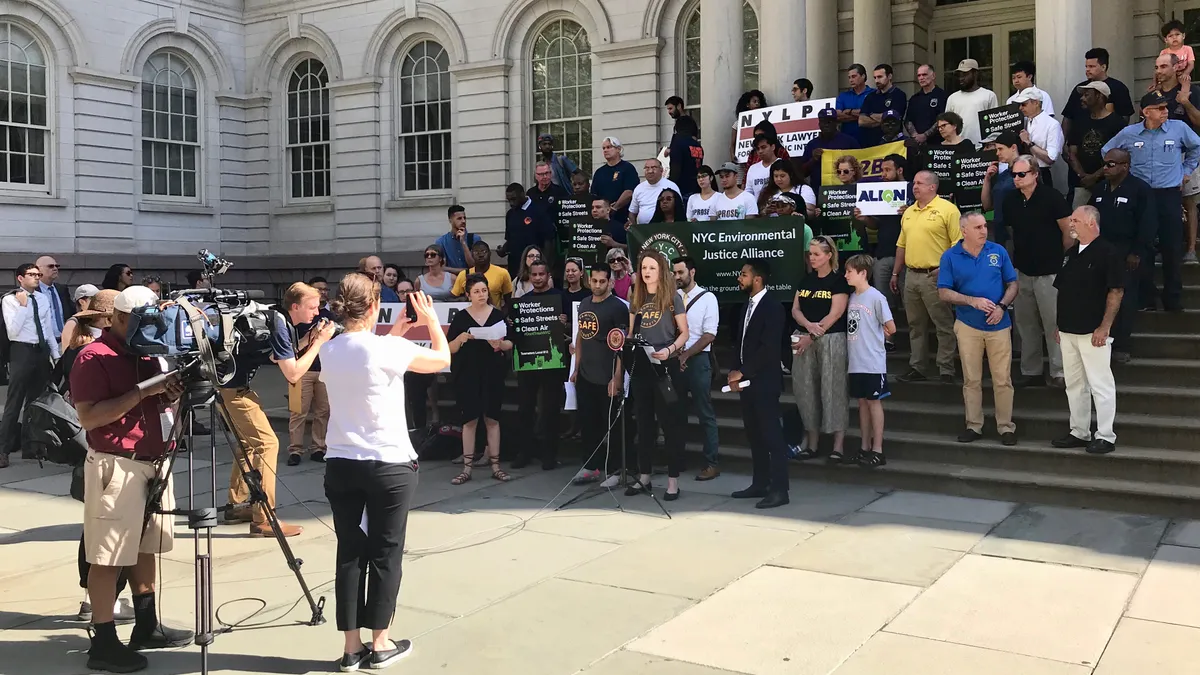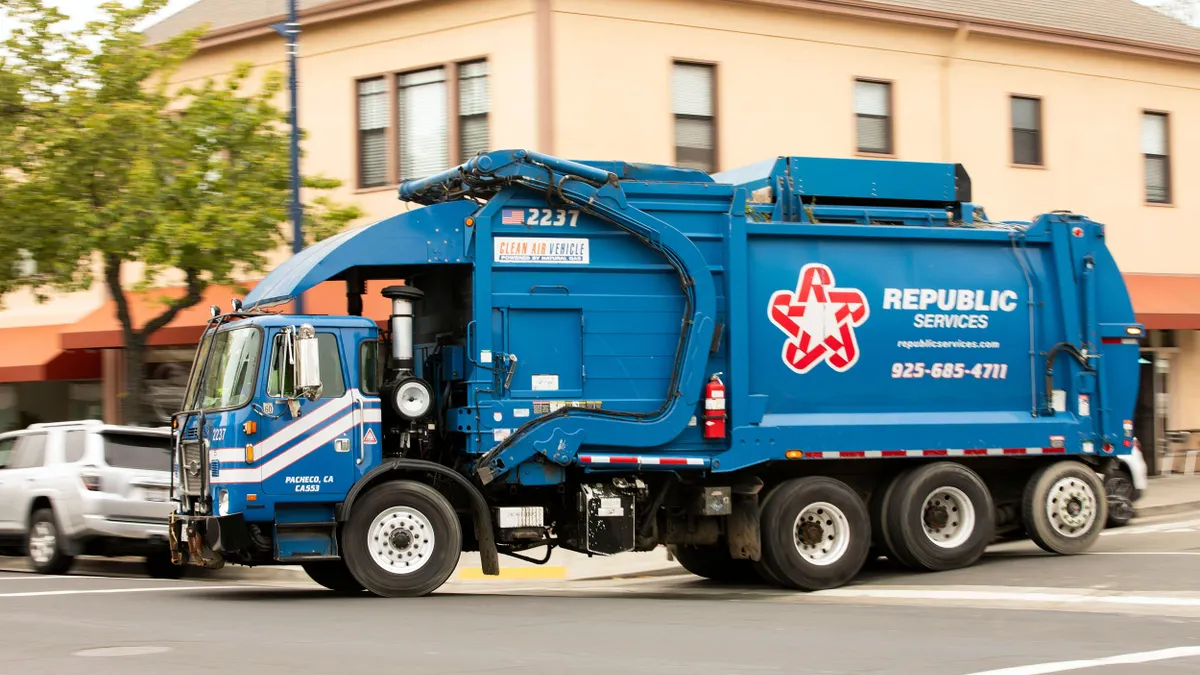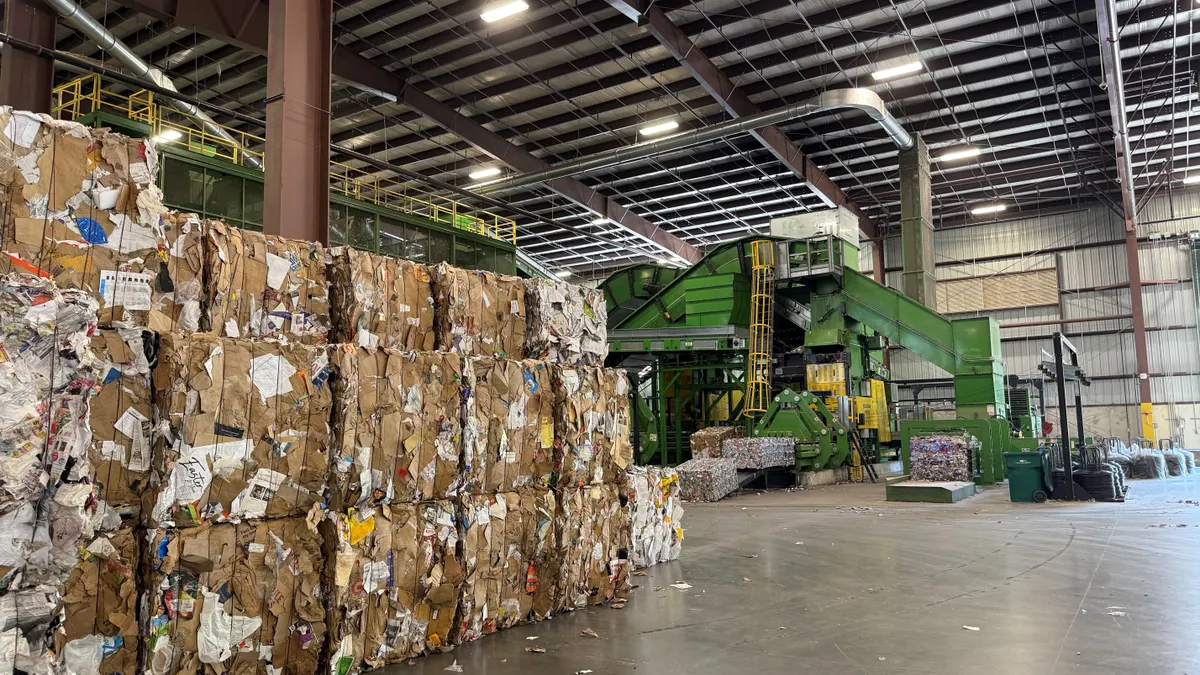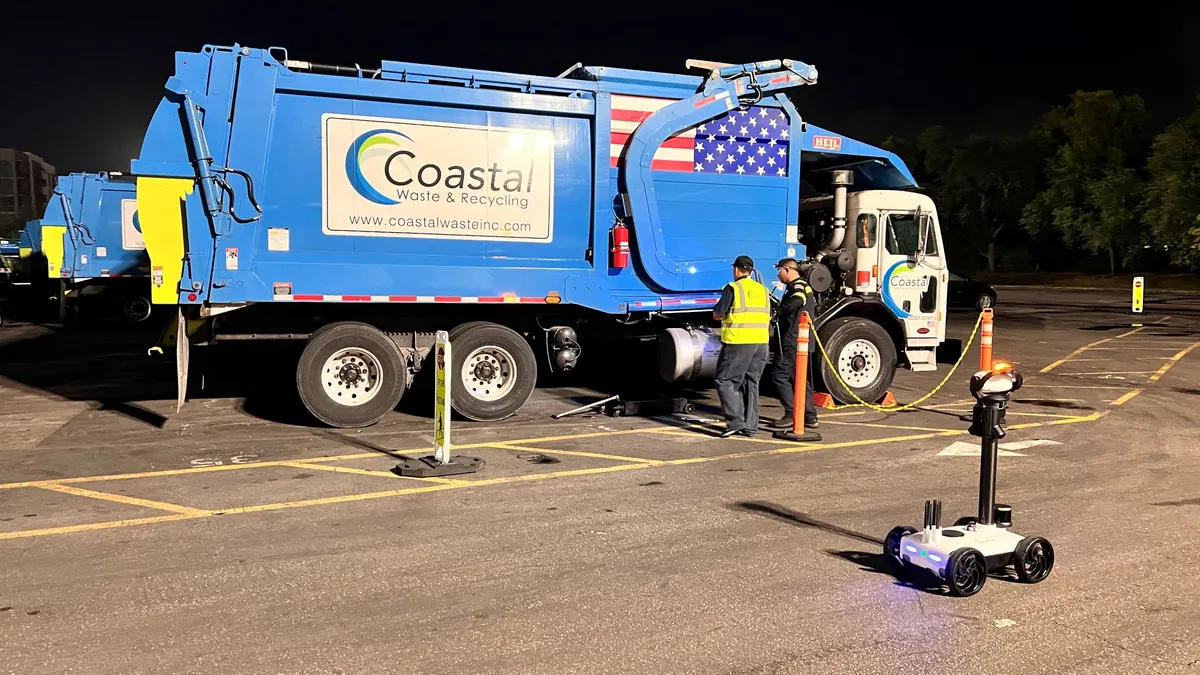UPDATE, Oct. 23, 2019: A final version of New York's commercial waste zone bill, Intro. 1574-A, has been released to stakeholders and submitted in time to meet legislative aging requirements for a potential Oct. 30 vote. The bill now has 26 sponsors.
Aside from new language about employee retention during a transition period between companies, the text is largely similar to a previously released draft. The system will have at least 20 zones, with up to three companies per zone, and no company will be awarded more than 15 contracts. Separate contracts for containerized waste will not count toward that limit.
Oct. 11: After months of speculation, supporters of New York's commercial waste zone plan have struck a deal over how to proceed with a plan to reshape the local market.
Council Member Antonio Reynoso and members of the pro-zoning Transform Don't Trash Coalition (TDT) previewed the draft language yesterday morning in a Politico article, declaring a united front on how to move past the exclusive model they've long championed. Breaking a prolonged (yet cordial) stalemate with Mayor Bill de Blasio's administration, the new language calls for a non-exclusive model similar to what the city has supported since last year.
"We are pleased to have worked with Council on this bill to bring needed reform to the industry," DSNY Director of Communications Belinda Mager said in a statement. "We look forward to the upcoming vote on this bill and moving forward with implementation."
The plan, which will have significant implications for decades to come, could be up for a decisive set of New York City Council votes as soon as this month.
Key changes
While the 55-page draft contains plenty of new details — covering reporting requirements, micro-hauler vehicles, transition planning and much more — its most notable updates fall into three categories.
Competition and customer service
These foundational elements have drawn the most attention and generated significant discussion among zoning supporters. Reynoso believes the changes strike a balance between what advocates, DSNY and business groups want.
- Each franchise zone could now have up to three contractors (as opposed to one), though it's unclear how many will end up in each zone. Like in prior iterations, no company could be awarded contracts for more than 15 of the city's 20 expected zones.
- A new provision would create up to five citywide contracts for servicing containers of 10 cubic yards or more. This will allow hospitals and large commercial real estate owners to potentially keep using the same company across multiple locations, regardless of zone boundaries. Sources indicate these contracts could be particularly attractive for new market entrants as compared to manual collection.
- In an effort to recognize local companies, language has been added to consider existing business in geographic areas. Because bidders' local legal and regulatory histories will be reviewed, this may help even the playing field against outside bidders with no record by nature of being new to the market.
"If you have a history of doing work in the city, and it’s good work and you have a lot of clients, then we want to give you a shot at that zone," Reynoso told Waste Dive, while noting newcomers are still welcome. "If they’re a great company and they come from another place there’s no reason why we shouldn’t allow them to do work here."
Environment
The potential to reduce greenhouse gas emissions, both from vehicles and waste disposal, has been another core message in the zoning campaign. While an exclusive system was seen as more favorable toward those aims, supporters have pivoted to what they say is a workable non-exclusive update with tighter fleet requirements.
"Part of why I was big supporter of exclusive zones was I wanted to limit pollution, and this green truck inventive really plays to that," said Reynoso.
- The new draft calls for bidders to submit plans to convert at least 50% of their fleets to "zero emissions vehicles" (as defined by California standards) by 2030. Any bids on RFPs released after that date would be expected to have a plan for 100% conversion by 2040.
- Bidders are still asked to submit plans for reducing emissions and air pollution through investments in processing infrastructure for recyclables and organics, but this is now a separate category that no longer includes fleet investment.
- Companies will also be asked to specify intended destinations for the materials they collect, with the city giving special consideration to facilities' proximity and history of regulatory compliance. This latter component has been described as an environmental justice mechanism for neighborhoods that have high concentrations of waste and recycling facilities, a growing regulatory focus in New York.
"By requiring that the transfer station be compliant with local, state and federal laws designed to protect public health and safety, and worker safety, we will be giving more of an advantage to haulers who use better acting, more sustainable and more equitably-sited facilities," Melissa Iachan, senior staff attorney with New York Lawyers for the Public Interest, told Waste Dive.
Labor
Ensuring positive conditions for local commercial waste workers has been a focal point for zoning supporters, especially in light of a 2018 ProPublica investigation. New language in the bill reflects comments by the Teamsters and others about how to strengthen labor standards under the plan.
"We negotiated this framework to end the race to the bottom that holds down wages and endangers workers of color," said Sean Campbell, president of Teamsters Local 813, in a statement. "Going forward, companies that provide good jobs will thrive and those that mistreat workers will not."
- The city's Business Integrity Commission currently regulates a rate cap, but it has never set a minimum rate. Companies and unions alike say this can incentivize competition at the expense of wages and service standards. New language gives the DSNY commissioner authority to set minimum rates "based upon a fair and reasonable return to the awardee" and other factors.
- The original bill called for mandatory safety training, but labor interests argued that it was not sufficiently comprehensive because it allowed room for customization by employers. The new draft goes into greater detail about required training and creates a uniform certification for employees that will be transferrable.
- In a nod to the likely potential for industry consolidation, which some believe could ramp up as soon as next year, council staff also told stakeholders additional language is forthcoming to "mandate employee retention if a carting company goes through a merger or acquisition."
Next steps
Many of the debate's key stakeholders are still trying to gauge what these changes mean for them. Multiple companies — including Action Environmental, Waste Connections and Waste Management — either said they were still reviewing the language or didn't respond to a request for comment.
Others, like Laborers Local 108, have expressed misgivings. Secretary Treasurer Mike Hellstrom said he would prefer to see a specific price floor written into the bill, rather than left to the city's discretion, and concluded "there's still much to be discussed."
A zoning opposition group, which represents smaller companies, also responded with skepticism.
"If its sponsors believe it’s so great, the Council should immediately agree to at least one round of public hearings before adopting something that could lead to chaos, uncertainty and great risk that the basic job itself — picking up 12,000 tons of waste and recyclables every night – won’t get done as even more companies exit the industry," said Kendall Christiansen, executive director of New Yorkers for Responsible Waste Management, in a statement. "Continuous improvement would make a difference sooner, better and cheaper than this massively complex — and misguided effort."
Reynoso dismissed that request, saying the bill already had its one required hearing on June 27.
“No one that wants an extra meeting wants it to have a meaningful conversation about waste zoning,” Reynoso said.
Comments are being accepted on the draft until Oct. 16. Reynoso anticipates potentially making further changes before introducing amended legislation for a vote in the sanitation committee, which he chairs. Supporters hope the final bill will be ready for a vote by the full council on Oct. 30.




















